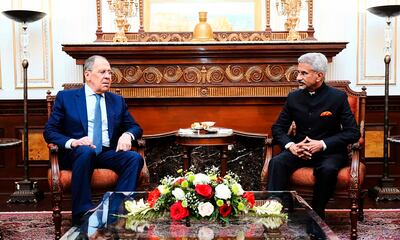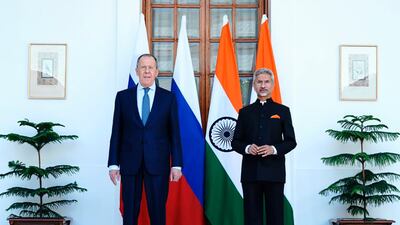Russian Foreign Minister Sergey Lavrov on Friday lauded India’s independent foreign policy as Russia offered to sell oil and military equipment to New Delhi, which is under western pressure to scale down its relationship with Moscow.
Mr Lavrov is on a two-day visit to New Delhi and held extensive talks with his counterpart Subrahmanyam Jaishankar and met Prime Minister Narendra Modi to extend Russian President Vladimir Putin’s “best regards” message.
India has consistently refused to condemn Moscow — a Cold War ally — for its invasion of Ukraine and repeatedly abstained from voting on western-backed resolutions at the UN.
“I believe that Indian foreign policies are characterised by independence and the concentration on real national legitimate interests,” Mr Lavrov said in New Delhi.

Without naming the US, Mr Lavrov said “some countries” were putting pressure on India to take sides but Moscow's and New Delhi's independent foreign policies made them “good friends and loyal partners”.
He confirmed that Moscow and New Delhi were moving forward to implement a “rupee-rouble mechanism” to bypass what he called illegal western sanctions that bar countries from trading with Russia.
“Many years ago, we started moving in our relations with India, with China, with many other countries, from using dollars and euros to more and more use of national currencies. Under these circumstances this trend, I believe, will be intensified,” Mr Lavrov said.
There has been no official response from India on the proposed new trading mechanism.
Mr Lavrov also said Russia was ready to sell “anything” to India, despite the western sanctions.
“If India wants to buy anything from us, we are ready to discuss and reach mutually acceptable co-operation,” he said.
Indian oil companies are reported to have purchased millions of barrels of discounted Russian crude oil in recent weeks and plan to further shore up imports of coking coal and other products, despite western attempts to isolate Moscow.
India imports the majority of its 85 per cent energy requirements from West Asia. Russian imports currently form about one per cent of requirements.
New Delhi has remained in the focus of the West — it shares strategic ties with both the US and Europe — to counter the growing influence of China in the Asia-Pacific region.
Mr Lavrov’s praise for New Delhi came hours after British Foreign Secretary Liz Truss and the US deputy national security adviser Daleep Singh urged India to stand up against Russia’s “appalling” actions in Ukraine.
Both the top western officials were in New Delhi on Thursday as part of a global push to corner Moscow through sanctions for its invasion of Ukraine.
Ms Truss said the UK was keen to “strengthen” its relationship with India, while Mr Singh warned of “consequences” for circumventing US sanctions.
“Yes, there are consequences to countries that actively attempt to circumvent or backfill these sanctions,” Mr Singh said.
He also said that Russia was an “unreliable” partner and warned New Delhi that Moscow won’t come to its aid if China intrudes into its territory along the disputed Himalayan border. In 2020, 20 Indian soldiers were killed in a mass brawl with Chinese Army personnel,
Last week US President Joe Biden called India’s response to Russian actions “somewhat shaky”.
Russia invaded Ukraine on February 24 in an offensive that has killed thousands of people and led to more than four million refugees fleeing the country.
“Our meeting today takes place in a difficult international environment … India, as you are aware, has always been in favour of resolving differences and disputes through dialogue and diplomacy,” Mr Jaishankar reiterated India’s stand after meeting Mr Lavrov.
New Delhi and Moscow are old allies and India calls it a “time-tested friend” and its major strategic and military partner.
India has a long list of Russian-made weapon inventory ranging from fighter jets and nuclear submarines to battle tanks and assault rifles.
Moscow delivered the first batch of S-400 missiles to New Delhi in December under a $5.4 billion defence deal.
Mr Lavrov’s New Delhi visit came following his two-day stopover in China, India’s regional rival, on Wednesday to attend a multilateral conference on the Afghanistan situation.
Beijing and Moscow are close allies and major security and military partners and their growing relationship has further put New Delhi in a tricky spot.
China, like India, has refused to condemn Russia's invasion, which has further boosted Beijing's relationship with Moscow.
Mr Lavrov on Wednesday hailed China’s role as part of a new “multipolar, just, democratic world order".
Moscow and Beijing in February declared they shared a “no-limits partnership".


